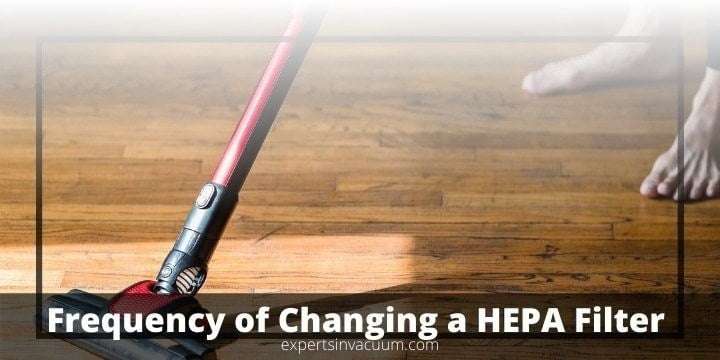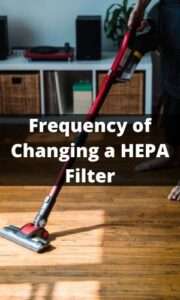Vacuum cleaners have different kinds of filters and HEPA vacuum cleaners have HEPA filters. While some are reusable and can be washed and cleaned, others must be replaced on a regular basis.
A HEPA filter improves indoor air quality by capturing dirt, pollen, smoke, dust mites, and other particles. The HEPA filter has a long lifespan, and at times, you may even forget to change yours.

However, HEPA filters also require to be changed over time and the replacement is crucial for the optimal performance of your vacuum cleaner. This article discusses how often you should change your HEPA vacuum filter. Continue reading to find out more about the subject.
In this post we will cover:
- How Often Should You Change Your HEPA Vacuum Filter?
- Maintenance Tips
- Can you wash and re-use HEPA filters?
- What distinguishes a HEPA filter from other types of filters?
How Often Should You Change Your HEPA Vacuum Filter?
Generally, HEPA vacuum cleaners are required to be changed every month. However, the frequency of how often to change a HEPA vacuum filters varies based on your vacuuming habits, the vacuum cleaner, and other signs indicative of a replacement being required.
Vacuuming Habits
If you vacuum once a week or once every two weeks, then your HEPA filters will have a longer lifespan since they are used less often. Therefore, the replacement will also the less frequent such as once a year.
However, if you use your HEPA vacuum cleaner on a daily basis due to high traffic in your home or the existence of pets and small children, then the change of the filter has to be more frequent depending on your cleaning needs.
Therefore, you need to know the frequency that works for you so that you can promptly replace your HEPA filters.
Type of Vacuum
For commercial vacuums, the HEPA filters in them require to be changed twice a year since they are normally used continuously on a daily basis.
If you use your HEPA vacuum in a commercial setting, then this should be the frequency of replacement. Also, review the filter twice a week for any issues.
Residential HEPA vacuums, on the other hand, clean little dust in a year. Therefore, their HEPA filters tend to last longer. The filters have been designed to be replaced at least once every three years for maximum filtration.
Signs that Warrant Replacement
There are signs to watch out for that indicate that your HEPA vacuum filter should be changed and they include the following:
A moldy odor: you will notice the odor as you run your vacuum, and this is an indication of a significant problem with your HEPA filter. When you notice the moldy smell, change your HEPA filter since it is the major cause of the smell.
Allergy flare-ups: when you notice that you or any member of your family is experiencing allergy flare-ups, it is time to consider replacing your HEPA filter. Individuals with allergies are sensitive to poor air quality and will appreciate the prompt replacement of the filter as necessary.
Abnormal vacuum functioning: if your vacuum cleaner is not sucking up much air as it used to do or becomes louder than usual, it is an indication that the HEPA filter needs to be changed as soon as it is possible.
Heavy soiling: a vacuum cleaner filter that is heavily soiled needs to be replaced. That is because a heavily soiled HEPA filter will offer little protection against airborne contaminants that are hazardous.
Housing damage: if your HEPA filter gets damaged, such as by scratching or cracking, during a vigorous cleaning session, it is essential to change it immediately to keep the vacuum’s performance optimal.
Maintenance Tips
Put on a breathing mask and rubber gloves before you open your vacuum cleaner to replace the filters. Make sure that you have unplugged the machine from the power source. Then open the canister encasing the HEPA filter, remove it, and then observe it under a bright light.
Check the HEPA filter to know if it can be washed and reused. Shake it to remove particles and dust and then wipe with a damp paper towel. However, the best step to take is to replace it with a new one to improve your home’s air quality.
Set a reminder for changing your filter so that you know when to change it. Also, schedule regular maintenance and inspection of the HEPA filter.
Conclusion
An overused and clogged HEPA filter will have little impact on improving your indoor air quality. If your HEPA vacuum has a filter that does not operate adequately, your machine will only stir up dust, pet dander, and pollen.
Therefore, checking and replacing your HEPA filter whenever required will keep your vacuum cleaner functioning efficiently. If you use a clogged filter, it will damage your unit. However, the frequency of changing the filter depends on various factors.
These include your vacuuming habits, the type of vacuum cleaner you own whether commercial or residential, and other signs that indicate that a replacement is due, as discussed above.
FAQs
Is it worthwhile to invest in a vacuum cleaner with a HEPA filter?
HEPA vacuums are not yet the standard, but they can change your cleaning habits. A HEPA vacuum has various benefits beyond effective cleaning. The main benefit is the prevention of allergy symptoms by improving indoor air quality.
A vacuum cleaner with an average filter is great at collecting dirt with large particles, some pet hair, dander, and other relatively large contaminants. For many individuals, this is enough, but if you suffer from allergies and other respiratory issues, a HEPA filter is what suits your vacuum.
A vacuum with a HEPA filter is able to capture much smaller particles that cannot be captured by a vacuum with an average filter. A HEPA filter also clears dust mites, so if you have dust mite allergies or a significant contaminant problem, a HEPA filtered vacuum is your solution.
HEPA vacuums can capture contaminants released by asbestos because they can effectively clean up and contain harmful pollutants which make asbestos dangerous. Asbestos particles range in size from 0.7 to 90 microns, and HEPA filters capture particles as small as 0.3 microns.
If you have a smoker in your household, a HEPA vacuum will clear the air when it is polluted by their smoking. The HEPA filter will trap the smoke particles and flush out clean air. It will reduce unpleasant odors while protecting you from second-hand smoke.
Vacuums with HEPA filters perform better provided that they are properly sealed to prevent the escape of fine particles. The HEPA filter should be mounted in an airtight frame to prevent particles from getting around the filter.
The collection bag or chamber of the vacuum cleaner should also be properly sealed and the motor’s exhaust must also be completely sealed and filtered. A HEPA with seals that are properly designed is better at capturing contaminants.
A vacuum cleaner with a HEPA filter can be used as part of a household contamination remediation plan such as mold and lead. However, the vacuum will not solve your mold and lead problem by itself because proper procedures have to be followed to eliminate them.
Can you wash and re-use HEPA filters?
HEPA filters are not all made the same, and that is why you will find that there are some that are washable and reusable while some cannot be reused. HEPA filters are made using a mesh of interlaced glass fiber which can be damaged easily.
If the HEPA filter you have is not meant to be washed, washing it may allow small particles to pass through even if it appears the same to the naked eye. However, there are HEPA filters that are washable and reusable.
Therefore, unless your filter has a washable icon or is stated as washable, avoid washing it.
What distinguishes a HEPA filter from other types of filters?
A HEPA filter is a pleated mechanical air filter that has been tested and certified in accordance with current HEPA filter standards. The HEPA filter is different from regular filters in various ways.
The first is that a HEPA filter is made of thin glass fibers and activated carbon-based materials. Regular filters, on the other hand, are usually made of porous materials like polyester and cotton paper sheets.
Secondly, HEPA filters work by trapping irritant particles and harmful allergens in three different ways. Some are absorbed when they crash into the filter, others are caught in the moving airstream, while others are caught by diffusion.
Regular filters do not work in the same way, as they spread allergens and dust around the air in your home instead of removing them. That actually defeats the purpose of vacuuming, which is to get rid of dust and dirt particles and improve indoor air quality.
